Plextor M3 Pro (256GB) Review
by Kristian Vättö on July 1, 2012 1:45 PM ESTRandom Read/Write Speed
The four corners of SSD performance are as follows: random read, random write, sequential read and sequential write speed. Random accesses are generally small in size, while sequential accesses tend to be larger and thus we have the four Iometer tests we use in all of our reviews. Our first test writes 4KB in a completely random pattern over an 8GB space of the drive to simulate the sort of random access that you'd see on an OS drive (even this is more stressful than a normal desktop user would see).
We perform three concurrent IOs and run the test for 3 minutes. The results reported are in average MB/s over the entire time. We use both standard pseudo randomly generated data for each write as well as fully random data to show you both the maximum and minimum performance offered by SandForce based drives in these tests. The average performance of SF drives will likely be somewhere in between the two values for each drive you see in the graphs. For an understanding of why this matters, read our original SandForce article.
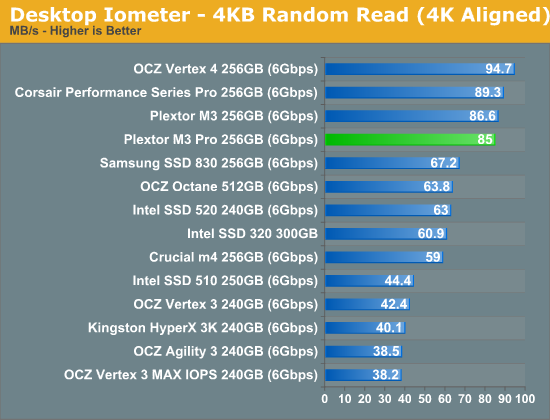
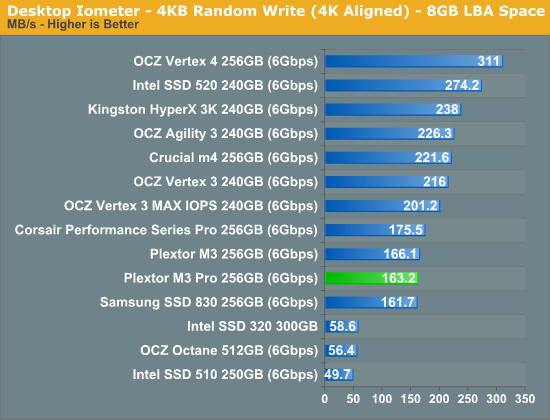
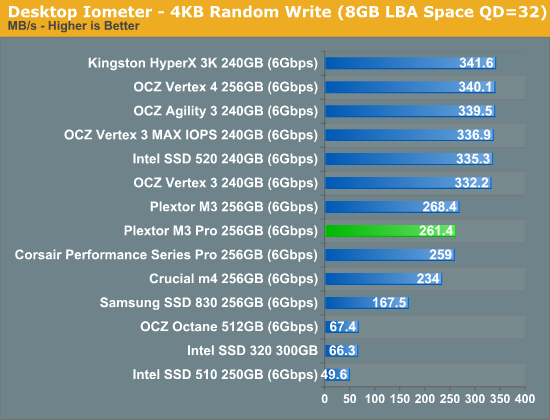
Random performance has not changed and the M3 Pro performs equally with the M3. The M3 Pro is actually slightly slower but the difference is only 1-3%, which is so small that it's within the margin of error.
Sequential Read/Write Speed
To measure sequential performance we ran a one minute long 128KB sequential test over the entire span of the drive at a queue depth of 1. The results reported are in average MB/s over the entire test length.
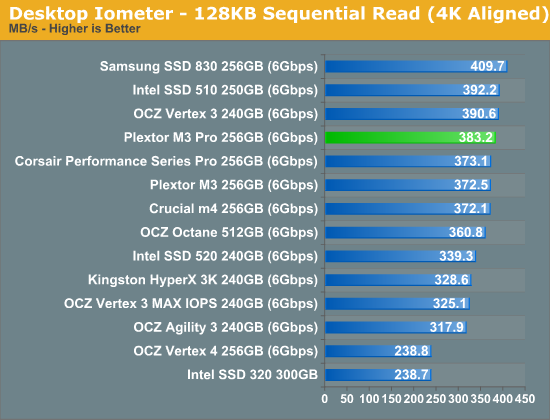
When moving to sequential read, the M3 Pro comes out as a faster drive compared to the M3. The difference is a mere 10.7MB/s, which translates to ~3%, so we aren't looking at a massive improvement here.
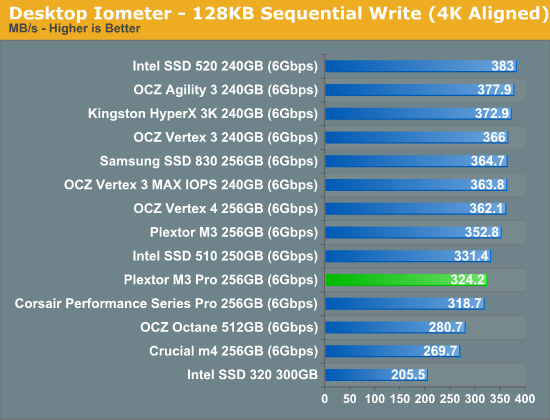
Sequential write speed turns out to be a surprise: the M3 is nearly 30MB/s (~9%) faster here. I even ran the sequential write test on the M3 Pro several times to make sure this is not an error on our end. However, it should be kept in mind that sequential write is just one aspect of performance—this doesn't mean that the M3 Pro is worse than the M3.










55 Comments
View All Comments
etamin - Wednesday, July 4, 2012 - link
Not sure if anyone mentioned this but the Vertex 4 (now firmware v1.4) can really use an update in both the charts (on newly reviewed SSDs) and in the SSD bench.Kristian Vättö - Thursday, July 5, 2012 - link
Just spoke with Anand, he promised that the updated results will be in Bench later this week. I'll also do a quick article about the results, should be up early next week or so unless something comes up (hint: I have a package coming from Plextor which needs urgent attention ;-)etamin - Thursday, July 19, 2012 - link
Awesome! just saw the updates in the Plextor M5S review!SSD_Privacy - Monday, July 9, 2012 - link
In the review you explain the features of Plextool,, but you do not say whether you actually used it and whether it actually erases data. This is very important as a study done at UCSD www.usenix.org/events/fast11/tech/full_papers/Wei.pdf showed that some SSD drives do not erase data even when they report that they have.This is a subject that this site has never addressed or even acknowledged.
msawyer91 - Thursday, August 30, 2012 - link
As a freelance software developer of a tool called WindowSMART 2012, which assess the health of hard disks and SSDs, and alerts you via email and on Apple and Android mobile devices, I had a need for SSDs.Since each SSD controller manufacturer (i.e. Marvell, SandForce, Micron) implements SMART attributes differently, I had a need to acquire SSDs (at quite an expense). I trolled the waters looking for the best deals. Some SSDs I looked to buy, knowing I would be selling them on eBay once I was done testing them. Others I was electing to keep, choosing to upgrade laptops to boost their speed. Throw in a caddy from newmodeus.com and I instantly had a dual-drive laptop--SSD for the OS and hard drive for the data. Talk about breathing some new life into a computer!
A few months ago I found this very SSD, the Plextor M3 256 GB, on Newegg. It was on sale for $199.99, and I couldn't pass it up. It had a solid 5/5 egg rating from over 300 reviewers, and finding an SSD at less than a dollar per GB? I was sold. I installed it in a laptop that's functioning as a SharePoint 2010 test server. With the SSD alone, I was easily trimming 10 seconds off of initial page loads. SharePoint is a beast, and a laptop isn't exactly the best suited machine for SharePoint. But for testing and tinkering, it suited my needs.
And this Plextor SSD made that laptop (an HP G60-230US) a whole lot faster. Well done Plextor! You've got a winner in this SSD.
If you want to check out the WindowSMART 2012 tool I put together, you can find it at http://www.dojonorthsoftware.net/TBM/WindowSMART.a...
Matt